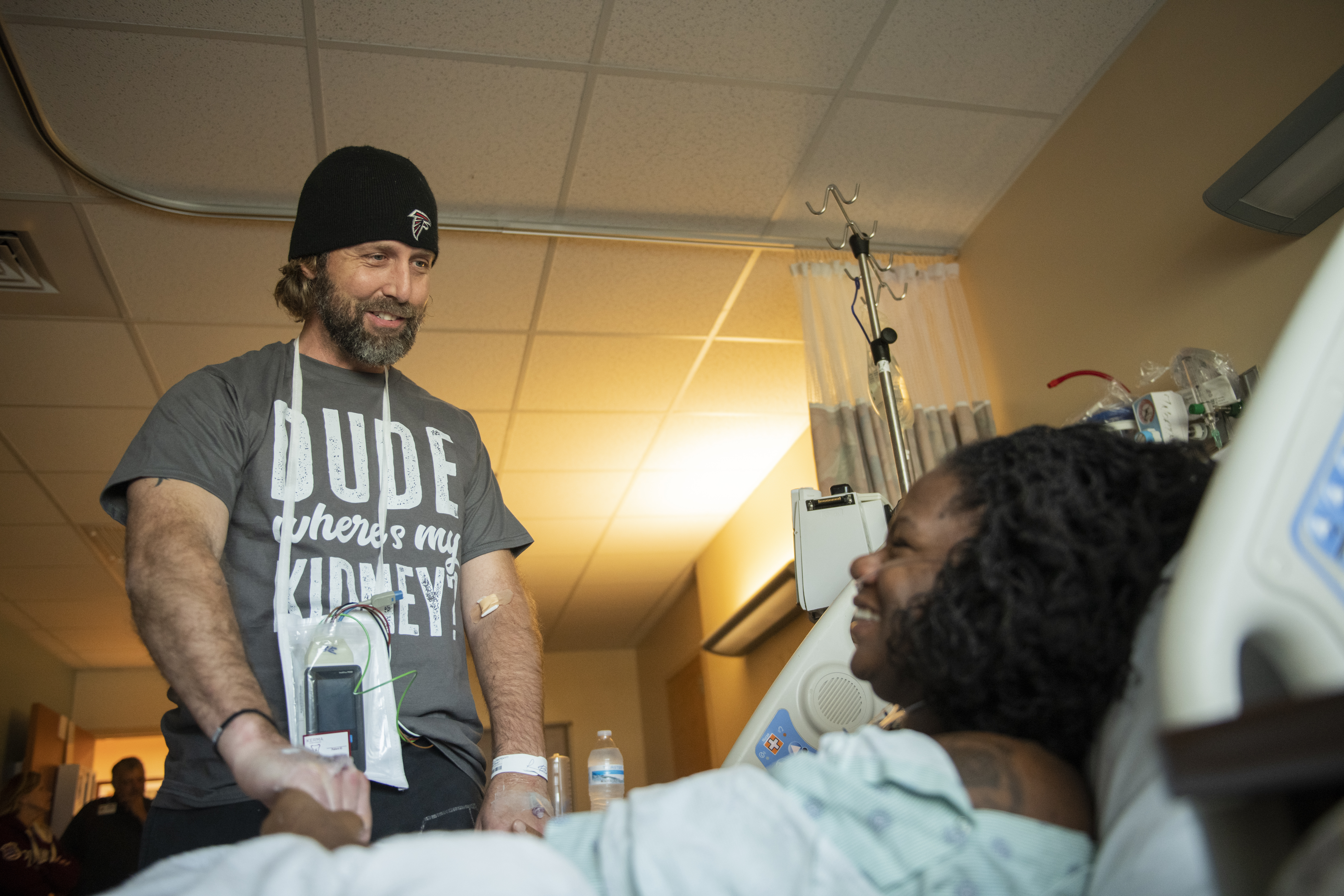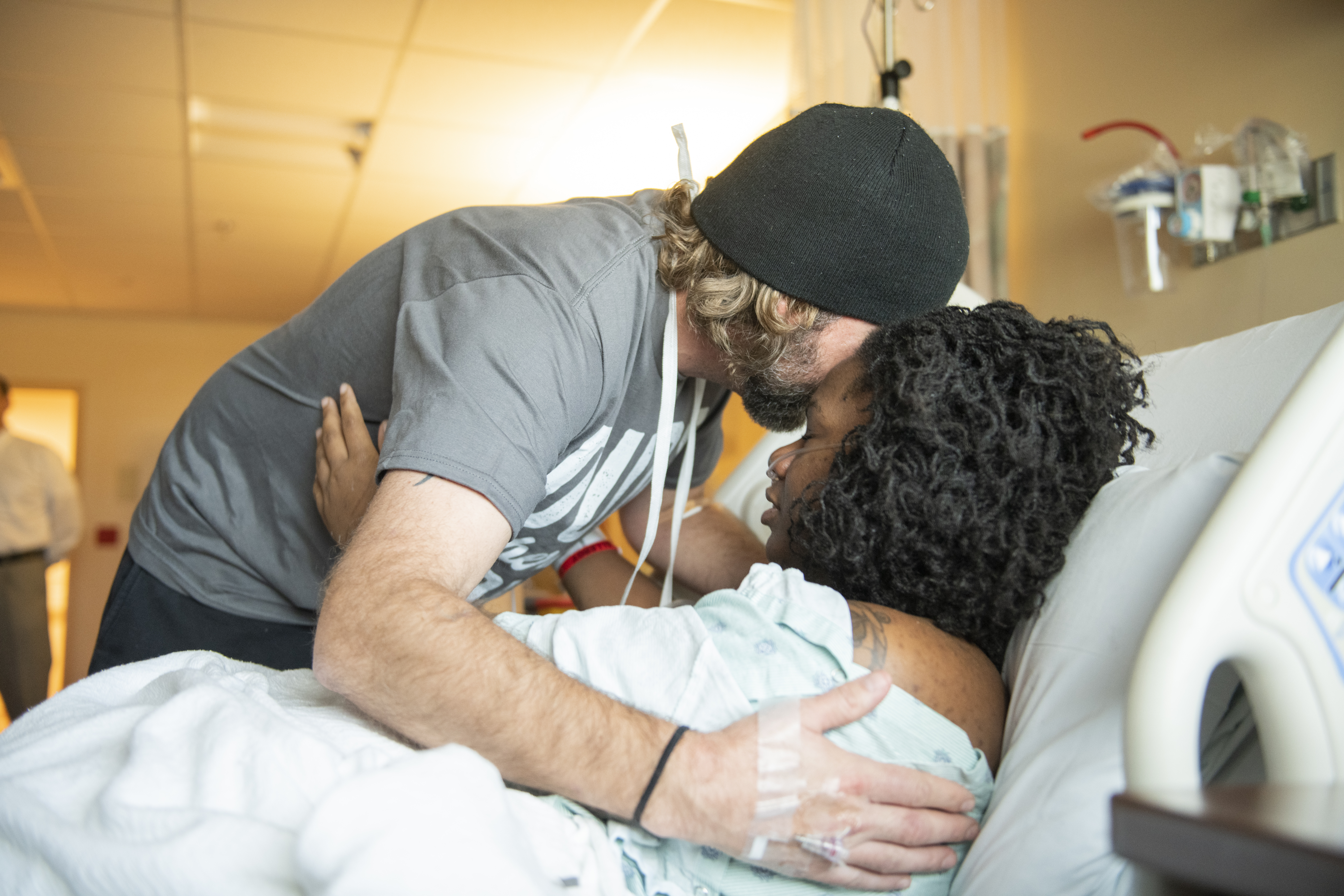
Living Kidney Donation
Memorial Transplant Institute offers kidney donors comprehensive care and personalized support.
Information For Living Kidney Donors
To make an appointment or learn more about our personalized approach to kidney transplantation or kidney donation, call
954-265-7450 Register to become a Living Kidney DonorFor patients with kidney failure, receiving a kidney from a living donor has huge advantages and minimal risk. When you become a living kidney donor, you give the gift of life – often a longer, fuller life than a kidney from a deceased donor would make possible.
If you are considering kidney donation, we can help. At Memorial Transplant Institute, we provide the expertise and resources you need to ensure you're supported every step of the way.
About Our Care Facility
What is Memorial Transplant Institute?
Memorial Transplant Institute was established in 2017 and comprises both heart and kidney transplant programs for children and adults. Memorial Transplant Institute is the only center in Broward County — and one of only two programs in South Florida — to offer kidney transplants to both children and adults.
The institute also includes a robust living donor kidney program. This program offers potential living donors medical expertise and educational support at every point in the living kidney donation process.
Where is Memorial Transplant Institute located?
Memorial Transplant Institute is based at Memorial Regional Hospital in Hollywood, Florida. Our living kidney donor office is located at 1150 N. 35th Avenue, Suite 390.
Why Consider Living Kidney Donation?
Kidney donation allows someone the unique opportunity to:
- Improve – and save – a life: There are at least four times as many people waiting for a kidney as there are kidneys available from deceased donors. When you choose to donate a kidney, you make that gap a little smaller. What's more, the average wait time for a kidney from a deceased donor is three years or more, whereas living donor transplants can happen within weeks. Organs from living donors often function better and last longer than deceased donor organs.
- Change your own life: Many living kidney donors say that the experience of donating a kidney changes their own life in meaningful and positive ways.
How to Donate a Kidney
At Memorial Transplant Institute, we are grateful to every person who selflessly considers donating a kidney. Our dedicated transplant team provides potential donors with personalized, expert guidance and support. Learn what to expect from the kidney donation process, which includes comprehensive education on kidney donation and a thorough living donor evaluation.
To make an appointment or learn more about our personalized approach to kidney transplantation or kidney donation, call
954-265-7450 Register to become a Living Kidney DonorLiving Kidney Donor Process
Memorial Transplant Institute's living kidney donor team includes experienced nurses, called "living donor coordinators," whose sole purpose is to guide potential donors through the donation process.
During your first meeting with the living donor coordinator, you will undergo a medical screening process. If you meet the criteria for the living kidney donor evaluation, you will receive materials describing the donation process. The coordinator can answer any questions you might have, both during this first meeting and at any time after. You will then be asked to complete a blood compatibility test.
We know donating a kidney is a big decision, so we will never rush you. Once you have reviewed all the material and you are matched to an intended recipient, we will schedule the living kidney donor evaluation at your request.
If you decide you'd like to move forward with donating a kidney, we begin the donor evaluation process to ensure you're a good fit. We assess all aspects of your health, as well as make sure you're ready for the psychological impact that donating an organ can have.
Donor evaluation testing includes:
Blood tests
A cross-matching blood test helps our transplant team determine how the recipient will react to your organ. Other blood tests determine if you have transmissible diseases, such as HIV, hepatitis or cancer. Some positive test results may need to be reported to local, state or federal health authorities for public health reasons.
Medical tests
We perform a range of tests to help ensure you are healthy enough for surgery. These tests also alert doctors to any conditions you might have that could be affected by having only one kidney. These tests may include:
- 24-hour urine collection
- Chest X-ray and electrocardiogram (EKG)
- Advanced imaging tests such as CT or MRI scans
- Colonoscopy, prostate exam, mammogram or other age-related screenings
- Gynecological examination
Advocacy
You can make a significant impact on the life of someone who needs a kidney. Learn the benefits of becoming a kidney donor. Transplant centers are required to provide an independent living donor advocate. This person is not a member of the intended recipient's medical team and will assist you during the donation process. An advocate:
- Promotes the best interests of the potential living donor
- Helps provide the potential donor with the necessary information about the process, including medical and psychosocial risks and the importance of post-donation follow-up
Psychosocial assessment
During the evaluation process, you'll also meet with a living donor social worker. This person will:
- Assess your mental health to make sure you understand all the information provided to you and that you can make an informed decision
- Make sure you have a support network available to you as you embark on this potentially emotional process
- Help you plan who will take care of you after kidney donation surgery
- Point you toward resources that may help defray travel costs related to living kidney donation
Living donors need to pay extra attention to their health to avoid complications such as hypertension or diabetes. Our care team follows donors closely for the first two years after donation.
After your donor evaluation process is complete, your case will be presented to a selection committee comprised of transplant specialists. This team will determine if you are approved for kidney donation. If you are approved, our attentive living donor team will continue to be by your side throughout the entire donation process, including follow-up care after surgery.
We'll advocate for you, guide you, answer questions — and remind you that you can choose to opt out of the donation process at any time, including the day of surgery.
Kidney Donation Surgery
If you're considering donating a kidney, you may wonder what living kidney donor surgery or recovery entails. At Memorial Transplant Institute, donors benefit from our minimally invasive approach to donor surgery and our attentive follow-up care.
Living Kidney Donation Surgery FAQs
Memorial Transplant Institute's living kidney donor program includes experienced professionals whose sole purpose is to guide potential donors through the kidney donation process. To begin, our living donor team will teach you about the benefits and risks of living kidney donation and address any questions you may have. Our personalized guidance and support continues all the way through your post-surgery follow-up care.
If you decide to become a donor, we will give you clear instructions on when to arrive at the hospital for surgery and how to prepare. If you know the person to whom you're donating a kidney, the two of you may be asked to arrive at the hospital at the same time.
Living kidney donation surgery typically takes between four and five hours from start to finish.
Memorial Transplant Institute's care team specializes in performing a minimally invasive approach called laparoscopic surgery. During this procedure, our surgeons use advanced robotic technology to make tiny incisions in the abdominal area.
Within the first 24 hours after kidney donor surgery, you will receive a visit from our team. We will continue to monitor your progress during your stay in the hospital.
Most living kidney donors stay in the hospital for two to three days. Before we discharge you from the hospital, we will make sure that the discharge plan previously coordinated is still in place.
Because of the small incisions our surgeons use in kidney donor surgery, patients experience a shorter recovery with less pain compared with traditional kidney donor surgery techniques. Some patients are back to work a few weeks after surgery.
Living donors need to pay extra attention to their health to avoid complications such as hypertension or diabetes. Our care team follows donors closely for the first two years after donation. We encourage regular physicals and will work with a donor's primary physician to monitor kidney function during that time.
Donating a Kidney
Whether you are considering donating a kidney to a loved one or to a fortunate stranger, you may have questions about whether you meet the requirements, how the living kidney donation process works and donation risks.
Here, our thoughtful living donor specialists answer common questions about the living kidney donor experience at Memorial Transplant Institute.
Kidney Donation Requirements FAQs
Almost any adult in good health can donate a kidney. In many cases, you can donate a kidney to someone of a different race, sex or blood type, thanks to recent advances in donor matching.
At Memorial Transplant Institute, our thorough donor evaluation process makes sure a donor is in sufficient physical and mental shape to safely undergo donor surgery.
Body mass index is one factor that our care team assesses during the donor evaluation process. Our specialists will determine whether a donor's weight may affect the safety of the surgery or recovery.
Yes. Although some people easily make this decision, many go through a bit of soul-searching before deciding. It's normal to be afraid of giving away part of your body and to feel guilty about not wanting to be a donor.
Although studies have shown that kidney donation does not affect the completion of a safe pregnancy and childbirth, it is typically recommended to wait to become pregnant at least six months after surgery. Be sure to talk with your physician or gynecologist about your interest in donation and the effect it could have on future pregnancies.
Kidney Donation Surgery and Recovery FAQs
Memorial Transplant Institute's team specializes in performing a minimally invasive approach called laparoscopic surgery. During this procedure, our surgeons use advanced robotic technology to make tiny incisions in the abdominal area.
Every surgery involves both risks and benefits. The short-term risk of living donation involves risks associated with anesthesia and major surgery. Possible long-term risks of kidney donation may include high blood pressure, reduced kidney function, hernia, organ impairment or failure that may lead to the need for dialysis, transplantation or even death.
At Memorial Transplant Institute, all donors go through a comprehensive evaluation process to assess all aspects of a person's health before moving forward. In addition, our living donor team will discuss the unique risks and benefits that living kidney donation may entail for each donor's specific circumstances.
The gift of an organ can save the life of a transplant candidate. The experience of providing this special gift to a person in need can serve as a very positive aspect of the donation. Some donors have reported positive emotional experiences, including feeling good about trying to improve the recipient's health and quality of life, allowing them to return to normal activities.
For many people, life after donating a kidney is similar to their life before kidney donation. You may feel back to normal a week or two after kidney donor surgery. Other people may take longer to get back to their regular activities.
Living donors need to pay extra attention to their health to avoid complications such as hypertension or diabetes. Our care team follows donors closely for the first two years after donation. We encourage regular physicals and will work with a donor's primary physician to monitor kidney function during this time.
Most medical costs associated with living donation are covered by the recipient's insurance. The government requires all certified transplant centers to charge a recipient's insurance an "acquisition fee" when he or she receives a transplant.
This fee covers the medical costs related to the donor's medical evaluation, transplant procedure and postoperative care (called the "donor protocol"). Anything that falls outside of this protocol is not covered. These costs could include annual physicals, travel, lodging, lost wages and other nonmedical expenses.
To make an appointment or learn more about our personalized approach to kidney transplantation or kidney donation, call
954-265-7450 Register to become a Living Kidney Donor
Georgia Kidney Donor Steps Up for Florida Patient
When Rhonda's coworker, John, learned that her kidney was failing, he came from Georgia to Florida to donate one of his kidneys to help her.
Kidney Donation: Why Choose Memorial Transplant Institute?
At Memorial Transplant Institute, our living kidney donor specialists are dedicated to providing all potential donors with expert, personalized care. We offer:
- Surgical expertise: Our surgical and medical teams have performed hundreds of successful living kidney donor surgeries over the past three decades.
- Convenience: At Memorial Transplant Institute, you can see multiple specialists in one place, for your convenience. During one visit, you can meet with your living donor advocate, social worker, and doctor as well as get necessary blood tests.
- Quicker, easier recovery: Our surgeons use a tiny incision and advanced robotic technology for kidney donation surgery. This minimally invasive approach means kidney donors experience less pain after surgery and recover more quickly.
- Personalized guidance and support: Our dedicated living donor advocate, social worker, and coordinator are here to make the kidney donation process easier for you. They'll tell you everything you need to know about the process and answer every question you have along the way. The living donor team will make sure you know that you have the option to opt out of kidney donation at any time – even on the day of surgery.





Patient- and Family-Centered Care
We treat patients and family members as partners in healthcare.
It matters to you. It matters to us.
Quality and Safety Data for Memorial Healthcare System
Our goal is to provide our patients with the information they need to make informed choices for themselves and their families.
View Quality and SafetyYou have a Right to Know About Prices
We want to give you the information you need to make important healthcare decisions, including the costs of our services.
View PricingMyChart Portal
View test results, schedule follow-up appointments, request prescription refills and more.
Login or Sign-up to MyChart


